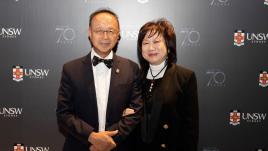New study to help victims of domestic and family violence during lockdown
As one unfortunate impact of COVID-19, experts predict an increase in the prevalence and severity of domestic and family violence (DFV). A new UNSW study will generate insights that can benefit those most at risk.
Associate Professor kylie valentine of the Social Policy Research Centre, UNSW Arts & Social Sciences explains in more detail. “Many of the changed social conditions to emerge from the pandemic point to the very real possibility that across Australia, more families will now be experiencing violence.
“The threat for already vulnerable women and children is heightened at this time, as too is the risk for frontline DFV workers, who are also subject to vicarious trauma and extremely difficult working conditions.”
Associate Professor valentine is spearheading a partnership between UNSW’s Social Policy Research Centre at UNSW and the Gendered Violence Research Network. The project aims to investigate the short-term impact of the pandemic, and policy responses in particular, around DFV in Australia.
As one of the 12 projects under UNSW’s Rapid Response Research Initiative, this research will provide critical knowledge on whether DFV occurred, and in what circumstances. More specifically, this project will assist in the following ways:
Providing evidence-based solutions to inform future policy: Findings relevant to DFV policy will address areas of urgent need, including the strengths and risks of technology-facilitated support such as online service delivery and telephone helplines, and the circumstances in which heightened risks of DFV can be mitigated and families’ safety protected.
Creating accessible and effective resources for the sector: This will include peer-reviewed articles in social work and public health journals, as well as guidance materials to help those working with DFV services to understand the emerging pressures they face and their new ways of working.
Facilitating knowledge-exchange and collaborations: The findings will distribute wisdom and strategies to achieving positive outcomes in rapidly changing and high-risk contexts, and allow organisations working in isolation to build support and practice networks. The project will also involve ongoing partnerships with a range of research organisations and government.
“We urgently need to understand the current climate and generate effective strategies that safeguard families during and long after this pandemic” says Associate Professor valentine.
The body of research to emerge from this initiative will be solutions-focused. Its aim is to generate real-world tools and strategies to protect families, and help the workforce support people experiencing DFV.








